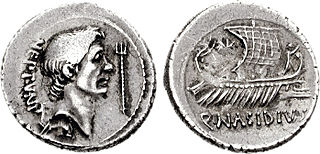Related Research Articles

The gens Valeria was a patrician family at ancient Rome, prominent from the very beginning of the Republic to the latest period of the Empire. Publius Valerius Poplicola was one of the consuls in 509 BC, the year that saw the overthrow of the Tarquins, and the members of his family were among the most celebrated statesmen and generals at the beginning of the Republic. Over the next ten centuries, few gentes produced as many distinguished men, and at every period the name of Valerius was constantly to be found in the lists of annual magistrates, and held in the highest honour. Several of the emperors claimed descent from the Valerii, whose name they bore as part of their official nomenclature.

The gens Minucia was an ancient Roman family, which flourished from the earliest days of the Republic until imperial times. The gens was apparently of patrician origin, but was better known by its plebeian branches. The first of the Minucii to hold the consulship was Marcus Minucius Augurinus, elected consul in 497 BC.
The gens Afrania was a plebeian family at Rome, which is first mentioned in the second century BC. The first member of this gens to achieve prominence was Gaius Afranius Stellio, who became praetor in 185 BC.

The gens Antistia, sometimes written Antestia on coins, was a plebeian family at ancient Rome. The first of the gens to achieve prominence was Sextus Antistius, tribune of the plebs in 422 BC.

The gens Sergia was a patrician family at ancient Rome, which held the highest offices of the Roman state from the first century of the Republic until imperial times. The first of the Sergii to obtain the consulship was Lucius Sergius Fidenas in 437 BC. Despite long and distinguished service, toward the end of the Republic the reputation of this gens suffered as a result of the conspiracy of Catiline.
The gens Helvia was a plebeian family at ancient Rome. This gens is first mentioned at the time of the Second Punic War, but the only member of the family to hold any curule magistracy under the Republic was Gaius Helvius, praetor in BC 198. Soon afterward, the family slipped into obscurity, from which it was redeemed by the emperor Pertinax, nearly four centuries later.

The gens Munatia was a plebeian family at Rome. Members of this gens are first mentioned during the second century BC, but they did not obtain any of the higher offices of the Roman state until imperial times.

The gens Nasidia was an obscure plebeian family at Rome. The gens is best known from Quintus Nasidius, one of the admirals of Gnaeus Pompeius Magnus during the Civil War. Although none of the Nasidii are known to have held any of the higher offices of the Roman state, a number are known from inscriptions. A coin of this gens depicts the head of Pompeius and a trident on the obverse, and on the reverse a ship, with the inscription Q. Nasidius.
The gens Perpernia, also found as Perpennia, was a plebeian family of Etruscan descent at ancient Rome. Members of this gens first appear in history during the second century BC, and Marcus Perperna obtained the consulship in 130 BC.

The gens Petillia or Petilia was a plebeian family at ancient Rome. Members of this gens first appear in history at the beginning of the second century BC, and the first to obtain the consulship was Quintus Petillius Spurinus in 176 BC.
The gens Rammia was an obscure plebeian family at ancient Rome. Members of this gens are first mentioned in the period leading to the Third Macedonian War, but no Rammius attained a position of importance in the Roman state until Quintus Rammius Martialis, governor of Egypt early in the second century AD.
The gens Rubria was a plebeian family at ancient Rome. Members of this gens are first mentioned in the time of the Gracchi, but they did not rise to prominence until imperial times. The first of the Rubrii to obtain the consulship was Rubrius Gallus, some time before AD 68.
The gens Saenia was a plebeian family at ancient Rome. Members of this gens are first mentioned in the final century of the Republic, and Lucius Saenius attained the consulship in 30 BC.
The gens Salvidiena was a plebeian family at ancient Rome. Members of this gens are first mentioned toward the end of the Republic, and from then to the end of the second century they regularly filled the highest offices of the Roman state.

The gens Sentia was a plebeian family at ancient Rome. Members of this gens are first mentioned in history toward the end of the Republic. The first of the Sentii to obtain the consulship was Gaius Sentius Saturninus, in 19 BC.
The gens Carrinatia was a plebeian family at ancient Rome. Members of this gens rose to prominence during the final century of the Republic, attaining the consulship in 43 BC.

The gens Statilia was a plebeian family of Lucanian origin at ancient Rome. Members of this gens are first mentioned in the third century BC, when one of them led the Lucanian assault on the city of Thurii, and another commanded an allied cavalry troop during the Second Punic War; but at Rome the Statilii first come to attention in the time of Cicero, at which point they held equestrian rank. The first of the family to attain the consulship was Titus Statilius Taurus in 37 BC, and his descendants continued to fill the highest offices of the Roman state until the time of Marcus Aurelius.
The gens Milonia was an obscure plebeian family at ancient Rome. The first member of this gens mentioned in history was Gaius Milonius, a Roman senator, and one of Cinna's allies. The empress Milonia Caesonia was presumably descended from this family. A few Milonii are known from inscriptions.
The gens Thorania, also written Torania, was a minor plebeian family at ancient Rome. Only a few members of this gens are mentioned in history, but others are known from inscriptions.
The gens Urbinia was an obscure plebeian family at ancient Rome. Only a few members of this gens are mentioned by Roman writers, but others are known from inscriptions.
References
- ↑ Dictionary of Greek and Roman Biography and Mythology, vol. III, p. 413 ("Q. Pleminius").
- ↑ Livy, xxix. 6–9, 16–22, xxxiv. 44.
- ↑ Valerius Maximus, i. 1. § 21.
- ↑ Cassius Dio, Fragmenta, 64 (ed. Reimar).
- ↑ Appian, Bellum Hannibalicum, 55.
- ↑ Broughton, vol. I, p. 304.
- ↑ AE 2003, 2006.
- 1 2 3 CIL XI, 500.
- ↑ CIL VIII, 387.
- ↑ CIL VIII, 2142.
- ↑ CIL VI, 21156.